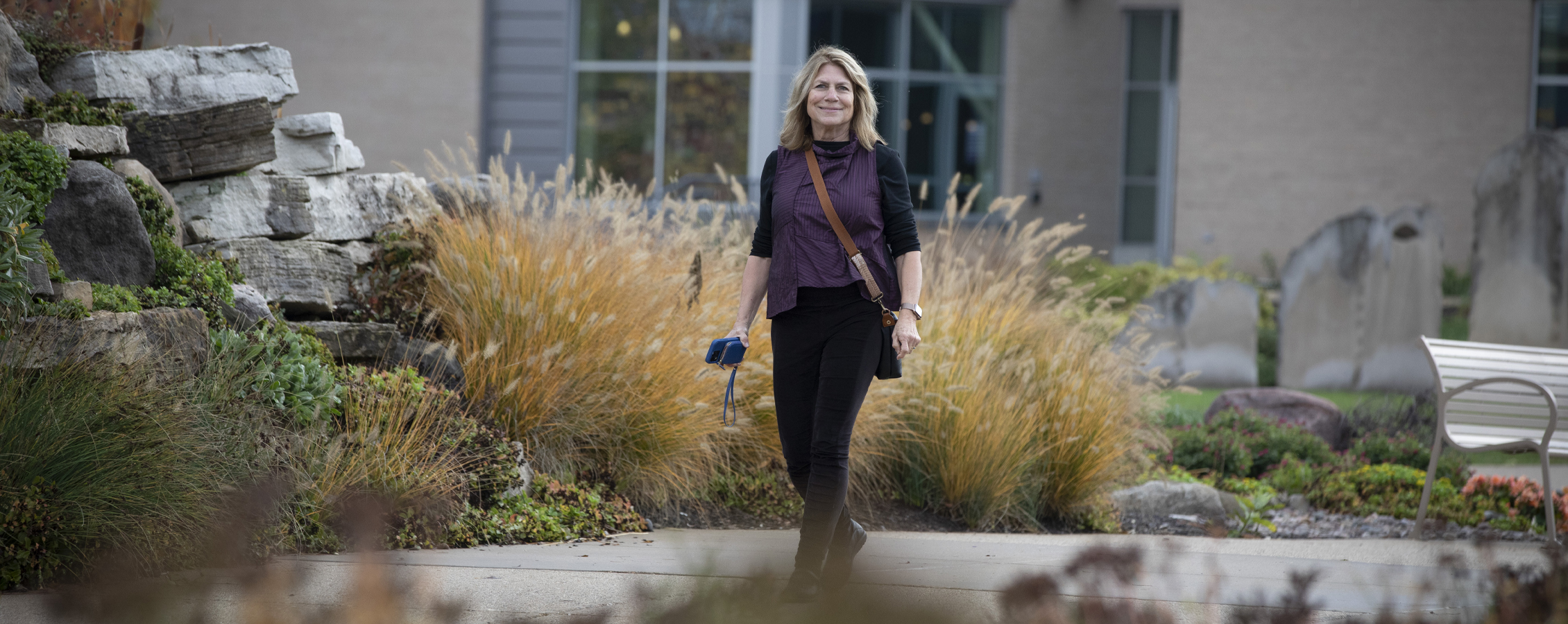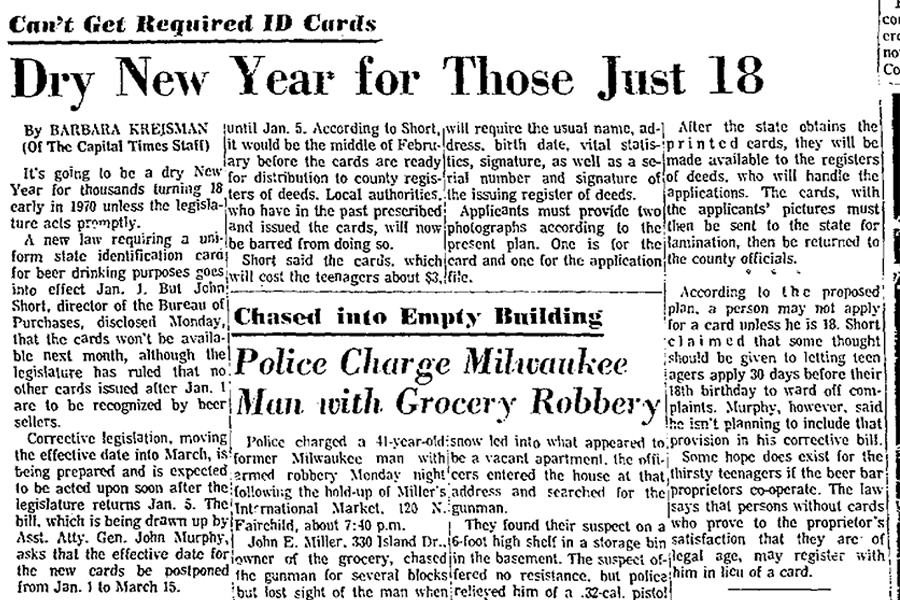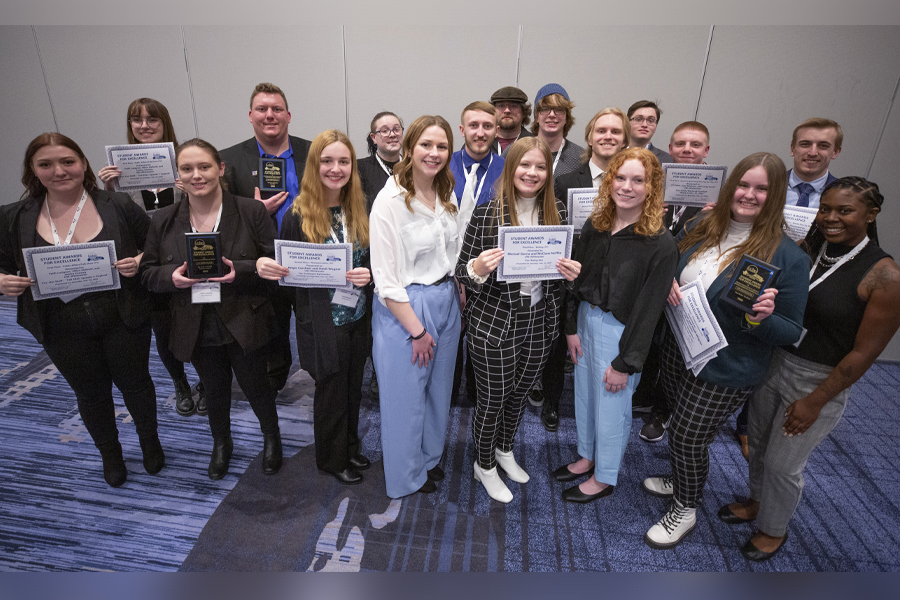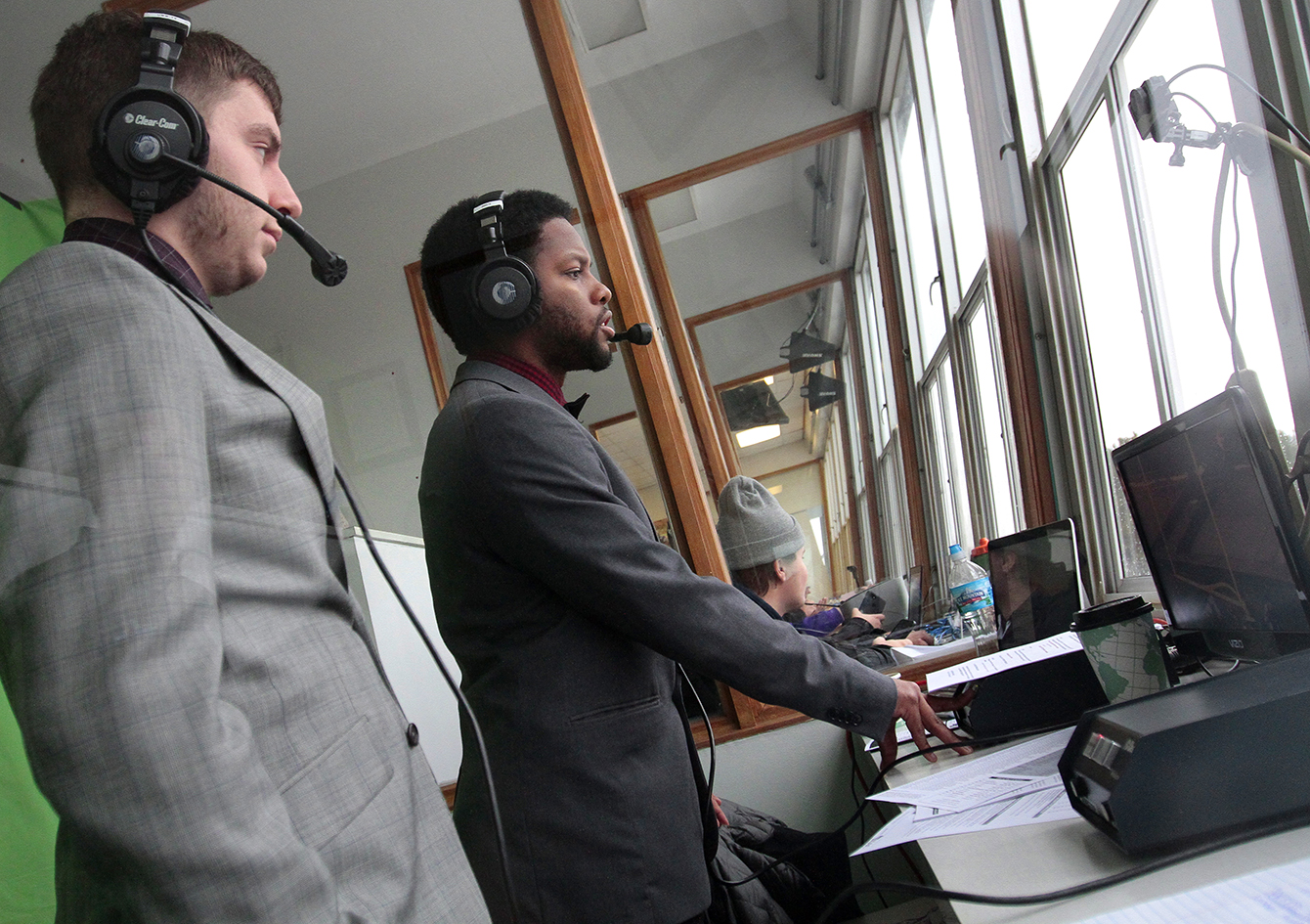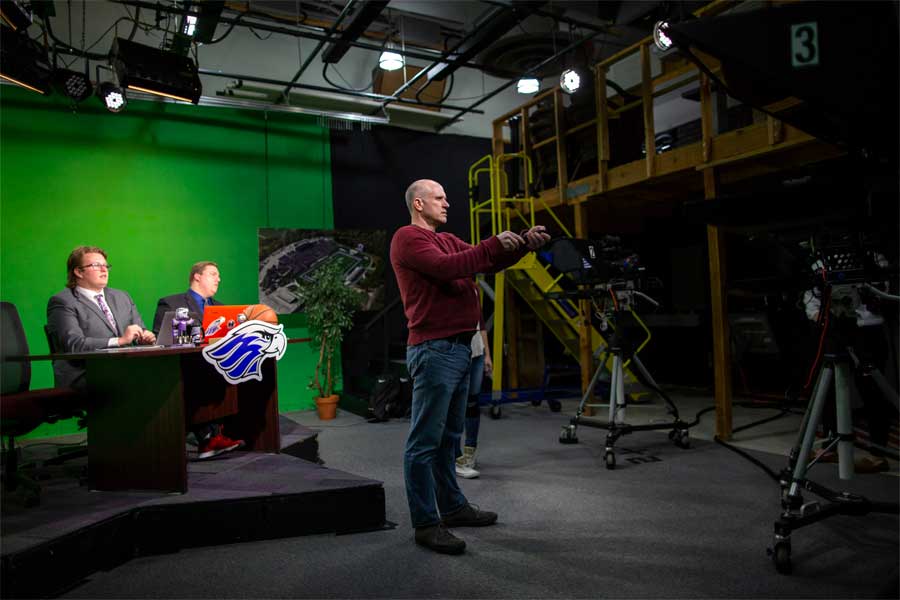Alumna Barbara Kreisman’s professional journey is one of ‘radical curiosity’
December 01, 2023
Written by Kristine Zaballos | Photos by Craig Schreiner and submitted
Barbara Kriesman calls herself a retirement journeys Sherpa — someone who helps individuals transition to retirement at a time they may fear losing their identity, network of colleagues, importance, power and influence.
It’s an unlikely role for a journalism major at the University of Wisconsin-Whitewater during the turbulent years of the late 1960s and early ’70s.
“My dad worked with the Capital Times,” the Madison native said. “I worked in the newsroom of the Cap Times for two summers, sharpening pencils until I had blisters on my hands and pulling copy off wire machines.”
Kreisman covered the racial strife and other troubles that were on campus at the time — as with colleges across the country — and was present for a key moment of the university’s history. She was at a dance on campus — the Ice-O-Rama — on Feb. 7, 1970, and witnessed Old Main, the flagship building for the university since its founding in 1868, burn. Because of her role with the Capital Times, she had a press pass and contributed on-site reporting for the newspaper’s coverage of the event.
After she graduated with a B.S. in journalism and a minor in English in 1972, she got a job at Consolidated Papers Inc. in Wisconsin Rapids, where she produced the employee newspaper. She would write retirement stories of people who had worked in the mill for more than 40 years, repeating the same story about how they planned to get a travel trailer and see the country. Within two years of their retirement, she often found herself writing their death notices.
That’s when a deep sense of emotion and curiosity — which she refers to as ‘radical curiosity’ — led her to conclude that people needed to have more in life than work. That curiosity and an interest in how people live their personal and professional lives would guide her work over the next five decades.
Kreisman will share her perspectives on Saturday, Dec. 16, as she takes the stage as the December 2023 commencement speaker.
Bringing radical curiosity to high tech
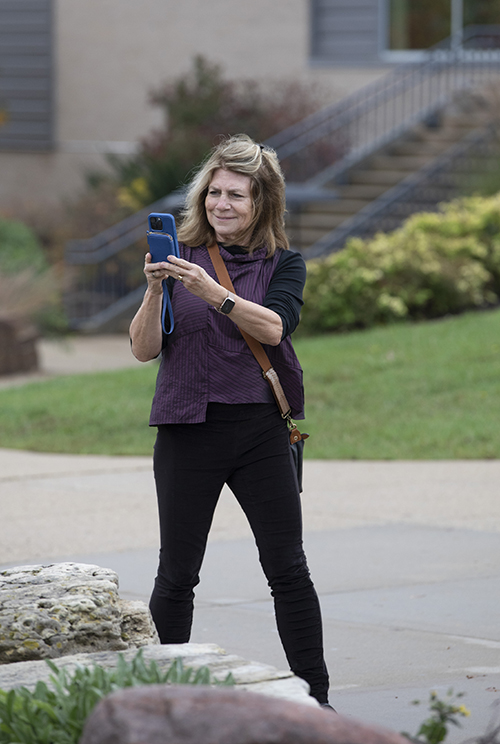
After CPI, she obtained a job in the news bureau at Arizona State University, where she could take classes for $5 each. She began studying business and counseling, wanting to follow her curiosity about people in the work environment.
After earning enough credit hours and new skills, Kreisman moved to the career center on campus, and found herself working with Motorola, one of the main recruiters, who eventually offered her a job in Austin, Texas. After six years, she was offered a role at another Austin-based company, PCs Limited. That start-up became Dell Computer, where she worked for 12 years, in strategic human resources, organizational development and staffing. At the time Kreisman began there, Michael Dell was in his early 20s.
“There were 150 people when I started, and more than 40,000 when I left,” said Kreisman, who was taking courses at the University of Texas as she worked her full-time job. “I used it as the petri dish, and did my dissertation on Dell as a case study seeking to understand the reasons people were leaving the company at a time when they could become millionaires.”
What Kreisman learned was that money wasn’t the answer to job satisfaction and employees were seeking more purpose in their lives. Because of the rapid growth, Dell was hiring nearly 700 people a week for months on end, and employees weren’t able to acclimate to the environment. Once again, Kreisman noted that work alone doesn’t lead to overall life satisfaction.
“People need to be recognized for their value and appreciated for what they do.”
Upon completion of her doctorate in organizational behavior and human resources at the University of Texas, she submitted her findings to Dell’s executive staff. Many of the suggested changes were implemented, and attrition began to drop. Leadership became more sophisticated, and within a few short years the company was twice lauded by Fortune Magazine as the “Nation’s Most Admired Company.”
A radically curious career in higher education
After earning her Ph.D., Kreisman chose to leave the high-tech sector and quickly landed a faculty role at the University of Denver. The first few years of teaching turned into an administrative role as assistant dean and then associate dean. She spent more than 17 years as associate dean of the Executive MBA Program for the Daniels College of Business at the University of Denver.
Key to her accepting a role at the University of Denver was its stated mission: A private institution dedicated to the public good. Kriesman found that her focus on purpose aligned with the values of the school, and she was able to implement a requirement in the executive MBA program that all students conduct an 18-month-long social impact project during their academic journey, in addition to their normal coursework, family requirements and professional roles.
“Some of the students didn’t care for the requirement,” said Kreisman. “But eventually all found it important. I was implementing what I had experienced at the paper company, coupled with what I learned at Dell. No matter the environment, people need purpose in their lives other than work.”
A team of faculty, community members and staff would evaluate the student projects based on impact, teamwork and outcomes. Kreisman and her husband, Scott McLagan, an adjunct professor at university and a former executive with Emerson Electric, donated a monetary award to the organization whose team “won.”
Kreisman and her husband were able to travel the world with their executive MBA students as part of the program’s global leadership course, which McLagan taught. Over the course of their travels, they visited some of the poorest and richest areas of the world, including South Africa, Rwanda, Botswana, Israel, India, Dubai, Hong Kong, China, Singapore, Thailand, Mongolia, Peru, Argentina and Greece.
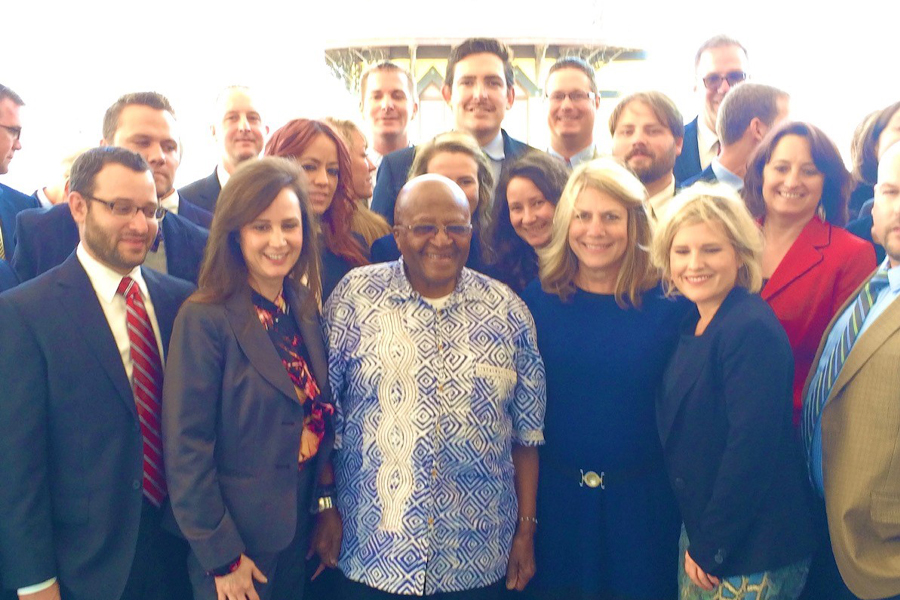
Reverend Desmond Tutu, front row center, with Barbara Kreisman, to the right of him in a blue dress, and students in the executive MBA program in South Africa in 2014. (Submitted photo)
“We always visited places and saw things normal tourists didn’t experience, such as orphanages, start-ups and economically deprived communities.”
Partly as a result of the program’s social impact requirement and the global leadership coursework, the executive MBA program was recognized by the Financial Times as one of the world’s top executive MBA programs for five consecutive years.
Putting retirement lessons into practice
In 2019, Kreisman retired from her role as associate dean but continues to contribute as a professor emeritus in the university’s Knoebel Institute for Healthy Aging, part of the School of Engineering and Computer Science. In this capacity, she and her husband co-facilitate "Retirement Journeys, New Roads, New Horizons," an enrichment course that is open to the public. Kreisman is also a part-time instructor for the Modern Elder Academy in Baja, Mexico, and Santa Fe, New Mexico.
In 2023, she and her husband were among the 20 individuals selected as Fellows in the University of Chicago’s new Leadership and Society Initiative (LSI) program. The program is designed for persons over 50 and prompts participants to focus on some of society’s most pressing issues through experiential learning, field trips and an international component.
After completing their 10-month program, the couple plans to bring what they’ve learned back to the University of Denver to implement a similar program focusing on community, social impact and learning opportunities for the aging population.
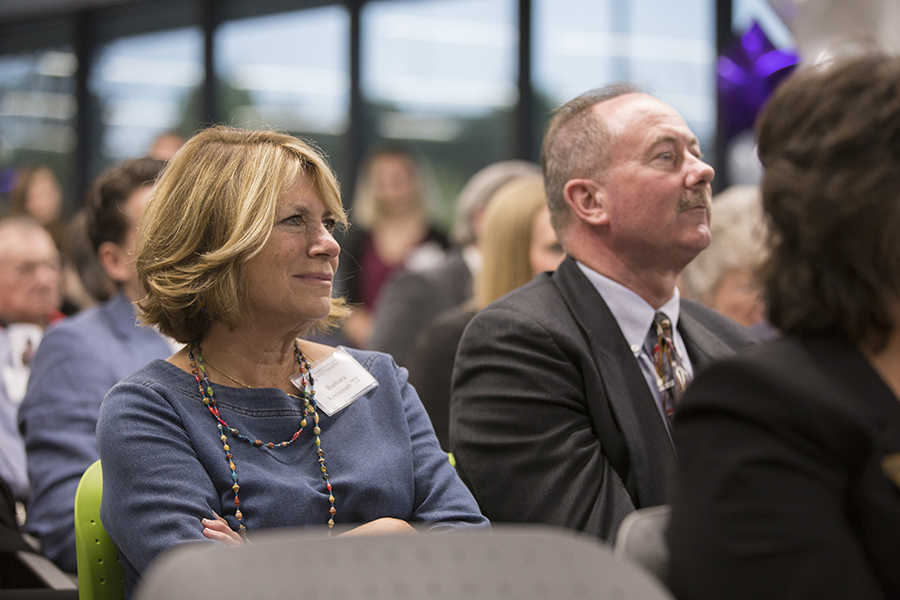
Alumna Barbara Kreisman at the dedication of the Mary Poppe Chrisman Success Center on Oct. 13, 2017. (UW-Whitewater photo/Craig Schreiner)
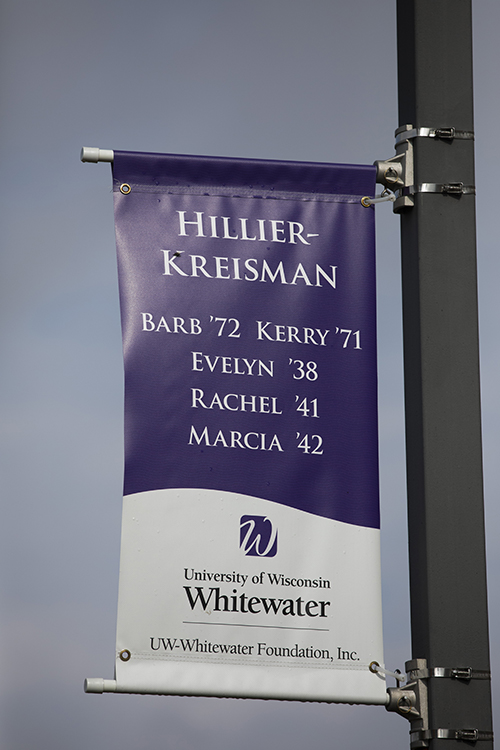
Kriesman’s ties to UW-Whitewater remain strong. Her mother, Evelyn Hillier, was a 1938 graduate, and Kreisman funded a study room in the Mary Poppe Chrisman Success Center in 2017 in her memory.
Two aunts, Rachel and Marcia, and a sister, Kerry, are Warhawks as well — a fact that is honored on a light pole banner on campus.
Since 2018, Kreisman has served as a member of the UW-Whitewater Foundation Board of Directors. As a member of the philanthropy and alumni engagement subcommittee, she encourages fellow alumni to engage with UW-Whitewater through participating in alumni events and donating to the foundation. She also regularly speaks to students in the university’s Doctorate of Business Administration program.
Kreisman’s long and varied professional journey embodies her own assessment of her alma mater.
“UW-Whitewater is a practical, grounded school that prepares people very well for their futures. All one needs is confidence — along with ‘radical curiosity.’
“That is what has enabled me to go from here to there — and back again.”

